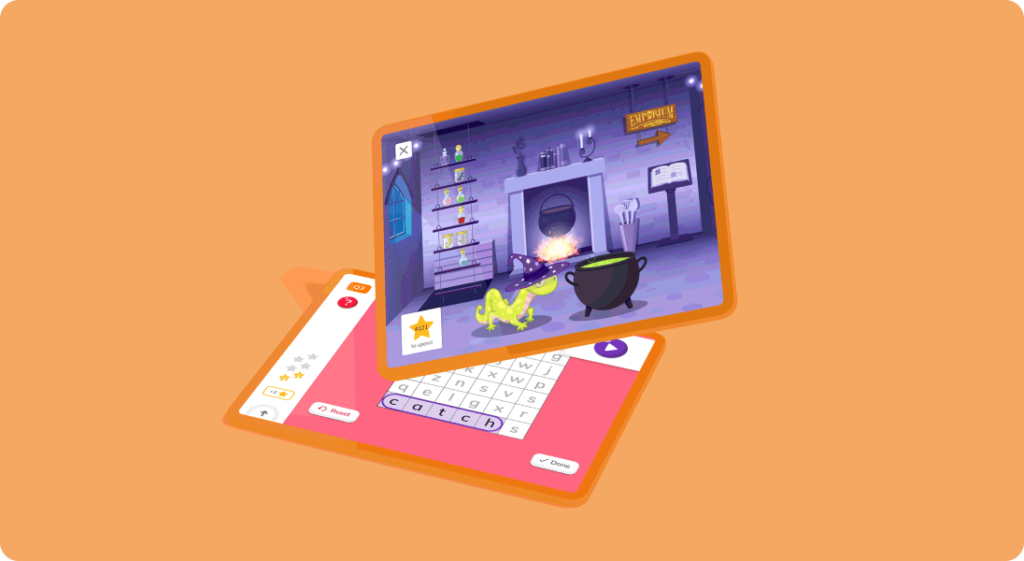Spelling is a really important skill – especially for children in Year 4! In this year, spelling words are designed to build a solid foundation for future language development.
Children further develop their spelling skills and expand their knowledge by learning more complex spellings and word rules. By learning a large variety of spelling words, they’ll expand their vocabulary and improve their language skills!
In this blog, we explore the spelling words Year 4 pupils are taught, along with key spelling rules and some tips to help them master even the trickiest of words. Let’s get started!
In this blog, jump to:
- What do kids learn in Year 4 spelling?
- Year 4 spelling words
- How to help kids learn Year 4 spellings
What words do kids learn in Year 4 spelling?
One of the key objectives of spelling in Year 4 is to help children develop a broad vocabulary. This will help them to understand and communicate more effectively, both in spoken and written language.
Learning how to correctly spell words can also boost their self-confidence, helping to boost their overall academic performance!
Another important aspect of Year 4 spelling is the development of phonics skills. Phonics refers to the relationship between letters and sounds. By learning how to spell words phonetically, pupils can develop the ability to spell words they haven’t necessarily seen written out before. Plus, it can also help to improve their comprehension of texts and their overall writing skills.
Year 4 pupils are also taught key spelling rules and conventions. There are lots of rules that learners can learn, such as the ‘i before e, except after c’ rule and the ‘silent e’ rule. Understanding these not only helps them to spell words, but to also understand why words are spelt in certain ways.

Year 4 spelling words
Here are 40 examples of spelling words that children learn in Year 4:
- Actually
- Address
- Believe
- Build
- Business
- Calendar
- Can’t
- Describe
- Exercise
- Extreme
- Famous
- Forwards
- Grammar
- Genial
- Guide
- Height
- Heart
- Imagine
- Island
- Knowledge
- Library
- Medicine
- Minute
- Naughty
- Often
- Peculiar
- Position
- Pressure
- Promise
- Quarter
- Recent
- Reign
- Straight
- Surprise
- Therefore
- Thought
- Various
- Weight
- Wore
- Woman

Look like a lot of words to learn? Don’t worry – DoodleSpell is here to help!
Created by our team of teachers, it’s an app that goes well beyond simply teaching children how to spell words, exploring the meaning behind them and how to use them in context.
Filled with fun, interactive exercises that adapt to each child’s level as they progress, it targets any words they’re finding tricky and tops up what they already know, ensuring continual progression through the KS2 curriculum.
Best of all, it covers all Year 4 spelling words (you can even add your own spelling lists if you’d like to) – and you can try it for absolutely free!
Or discover Doodle for schools
How adults can help kids learn Year 4 spelling words?
Teachers use a variety of strategies to help Year 4 students improve their spelling skills. For example, they may use games, worksheets and spelling quizzes to make learning fun and engaging. They also use word lists to help students practise spelling new words and reinforce key spelling rules.
Parents also play a vital role in helping their child develop their spelling skills. They can encourage their child to read regularly, which can help to improve their vocabulary, and create a supportive learning environment by providing resources such as books and spelling games.
Here are some strategies that you can use to teach spelling words:
- Use word lists: teachers and parents can provide kids with word lists that contain a variety of spelling words. Learners can practise spelling these words on their own, or adults can use them in spelling quizzes.
- Play games: You can make spelling fun by using games such as Scrabble, Boggle and Hangman. Not sure which game to start with? Check out our six favourite word games!
- Set fun writing activities: Children can practise spelling words by using them in their writing. For example, you could encourage your child or pupils to write a short story using them. Using them in context will make them much easier to learn – plus, it’s a great way to liven up traditional spelling practice!
- Use word puzzles: Crosswords and word searches are great tools to reinforce spelling words. Best of all, these puzzles are perfect for use as homework assignments or in-class activities (that kids will always look forward to!).
For even more spelling activities, be sure to check out our blog with lots of KS2 spelling activities and games!
In summary…
In conclusion, spelling is a key skill for Year 4 pupils to develop. By expanding their vocabulary and learning core spelling rules, they can improve their language and literacy skills.
Adults can help children develop their spelling skills by using a range of strategies and creating a fun, engaging learning environment. With the right support and guidance, all Year 4 pupils can become confident, competent spellers!
Looking for more fun ways to learn Year 4 spelling words? Be sure to give DoodleSpell a try. Going well beyond teaching spellings, its interactive games and exercises are fully aligned to the English KS1 and KS2 curriculum – and you can try it for free!
Or discover Doodle for schools





